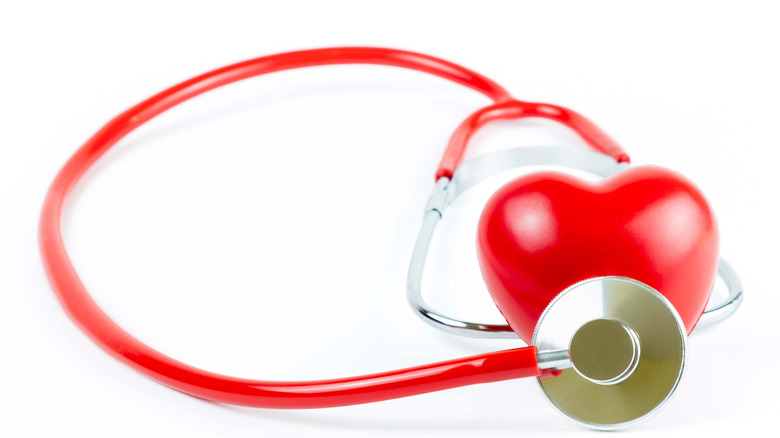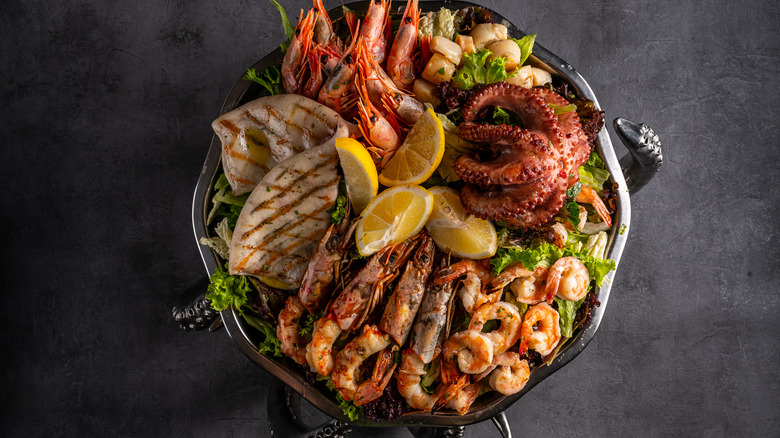What Happens To Your Body When You Only Eat Once A Day
Intermittent fasting is a style of eating that's gained popularity. Rather than focusing on what types of food you eat, you limit how much time per day you have to eat meals. Some people simply skip breakfast and have lunch and dinner. Some cram multiple meals into a small window. You can also limit yourself to one meal a day, which ends up being a fairly large meal.
In general, intermittent fasting has many benefits for the body. According to Harvard Health, eating at nighttime has been associated with increased risk of obesity and diabetes. Cutting out nighttime snacking is enough, in some cases, to improve the metabolism of people who suffer from such diseases. If you're interested in eating one meal per day, start by consulting your doctor to make sure that it's safe for you. You might want to try other, less restrictive forms of fasting that allow for multiple meals per day instead.
However, if one meal per day works for you and is sustainable, it can be a healthy way to eat. Here's what can happen to your body as a result.
You might lose weight
Losing weight can be a long and difficult process. Limiting yourself to one meal per day can help your weight loss efforts without lowering the number of calories you eat in a day, found a study published in Frontiers in Physiology. In the study, the researchers had a group of subjects eat three meals a day for a period of time, then switch to only one meal a day. They tried to make sure that the subjects ate the same amount of calories whether they were eating three meals or one.
While the researchers note that the subjects might've eaten fewer calories when they had one meal per day, they state that this could not explain why the subjects lost more weight when they ate only one meal. They reason that there must have been a change in the metabolism of people when they ate only one meal that caused them to burn more calories. Also of note was that people were just as physically active whether they ate one meal per day or three, meaning that fasting doesn't decrease activity.
You'll use fat for energy
When you exercise, your body uses a combination of fat and carbohydrates. When you're resting or exercising at a lower intensity, you mostly burn fat for energy. As your exercise gets more intense, you burn more carbs for energy. Scientists measure this using a number called respiratory exchange ratio. This number is either below or above one. If it's below one, you're using more fat than carbs for energy, according to a study published in Clinical Medicine Insights: Circulatory, Respiratory and Pulmonary Medicine.
Eating one meal per day makes your body use more fat for energy than carbohydrates. A study published in Frontiers in Physiology showed that people burned more fat during their workouts when they ate one meal per day versus three. This might help explain why people tend to lose more weight when they restrict their eating to just one meal. The researchers also note that eating only once per day didn't hurt their workout performance.
You might raise your LDL cholesterol
Low-density lipoproteins are known as the "bad" type of cholesterol. There are a few different types that your doctor might measure when they take a blood test, but they usually want to see how high your LDL levels are. High levels of this type of cholesterol are bad for your heart, says the Centers for Disease Control and Prevention (CDC). When there's too much LDL in your bloodstream, it can accumulate on the walls of your arteries. Over time, this can lead to blockages which cut off the blood flow to your heart or other organs.
Lowering your LDL levels is important if your doctor determines they're too high. Eating one meal per day can actually make things worse, according the U.S. Department of Agriculture. They explain that research shows eating one meal per day instead of three can actually be worse for your LDL levels, even if you lose weight while doing so.
You could have higher blood pressure
High blood pressure is known as the "silent killer," according to the American Heart Association. There are almost no warning signs that you have high blood pressure. That's why doctors regularly check using a cuff or automated machine to make sure that your numbers are normal. Your blood pressure is considered high if it's above 130. While your numbers will fluctuate throughout the day, if your blood pressure is consistently high over a period of time, it could increase your risk for heart disease.
The U.S. Department of Agriculture says that eating one meal a day can increase your risk for developing high blood pressure. This is in spite of that fact that eating less frequently can help you lose weight. If you're trying fasting to have a healthier heart, you might want to reconsider. Check with your doctor to make sure your blood pressure is under control before beginning a one-meal-a-day diet.
You'll lose body fat
Many diets are geared towards losing weight, body fat, or both. One way to measure changes in body fat is to use a body fat percentage test, which tells you how much of your tissue is composed of fat versus other tissues. Some people want to lose fat to show off their muscles, and others want to do so for health reasons. According to a study published in Proceedings of the Nutrition Society, eating one meal per day can help lower your body fat.
In the study, the researchers explain that subjects lost more body fat when they ate only one meal per day versus when they ate three meals. Even though they lost body fat, the researchers point out that there weren't many improvements in health markers such as lipid levels. That means people who want to lose body fat for aesthetic purposes could benefit from eating one meal a day, whereas those looking to be healthier might stick to three.
You'll be hungrier
While it might not come as a surprise, you'll probably be hungrier throughout the course of a day if you only eat one large meal. A study published in the Journal of the International Society of Sports Nutrition confirms that athletes who ate only one meal a day experienced greater hunger those who ate three meals.
Perhaps the most challenging aspect of eating only one meal a day is the mental toll it takes. You have to be disciplined enough to go through almost an entire day without eating. If you find that the hunger is too great, one meal a day might simply be too little for you. However, it is possible to do. One example of a large fast is Ramadan, a Muslim holiday. During Ramadan, Muslims fast from sunrise to sunset for 30 consecutive days, according to a paper published in Frontiers in Endocrinology. This shows that fasting through the day is possible for large groups of people.
You won't be more irritable than usual
Before you begin a fasting program, it can seem like an uphill battle. You might be worried that the lack of food throughout the day will affect you. People who get "hangry," which is slang for irritability that comes from hunger, might be worried that their mood will shift from a lack of food. While you will most likely feel hungry throughout the day, you probably won't feel any more irritable than normal.
A study published in the Annual Review of Nutrition tested people who ate only one meal a day on a variety of psychological factors. They found that fasting didn't make people more depressed, tense, angry, vigorous, or fatigued. This is important because it shows that there may be very few psychological side effects to eating only one meal a day. The researchers also report that there wasn't an increased sense of confusion while fasting.
You'll have higher HDL cholesterol
The word "cholesterol" carries a negative connotation, but not all cholesterol is bad. High-density lipoprotein or HDL cholesterol is actually helpful. HDL takes the bad cholesterol that floats around your bloodstream back to your liver where it can be flushed from your body, says the CDC. This decreases your risk for developing heart disease and stroke. While high LDL levels require intervention, if your HDL count is too low, your doctor might recommend lifestyle changes such as more exercise.
Eating one meal a day could increase your HDL cholesterol levels as well, suggests a study published in the Annual Review of Nutrition. The researchers show that people who ate one meal per day had higher fasting HDL levels than those who ate three meals. That might mean that eating one meal a day is helpful for people who have low HDL levels. Interestingly, the study also showed that eating one meal a day lowered LDL levels, which is contrary to other research on the topic.
You might miss the benefits of intermittent fasting
Intermittent fasting doesn't necessarily mean restricting yourself to only one meal a day. There are other options, such as eating two meals per day. That means you have a longer window of time in which you can eat. When it comes to fasting, eating a little more might actually be beneficial. A study published in Nutrients found that fasting and eating only two meals per day was helpful, but limiting that to one meal a day reversed the positive effects.
When restricting eating from three to two meals per day, the researchers list benefits such as reduction in obesity, asthma, and blood pressure. It's also protective against diabetes and cancer. When you drop to only one meal a day, those benefits seem to fade. They even note that you could eat three meals per day, as long as you fit that within a 6- to 8-hour time window. For instance, you could have a late breakfast, lunch, and early dinner.
You won't lose muscle
Understandably, you might be concerned that fasting could cause you to lose muscle. Many people drink protein shakes after their workout with the belief that consuming protein frequently helps build more muscle. Choosing to eat only one meal a day would directly oppose that thought. This could be particularly troubling for people who are trying to eat one meal a day to look leaner, because it would mean less muscle mass to show.
A study published in Frontiers in Physiology had subjects eat one meal a day, then eat three meals per day. They found that when people ate only one meal a day, they didn't notice any reduction in lean muscle mass. That means fears of losing muscle while fasting are probably unfounded. The researchers also found that eating once per day didn't have an effect on strength, meaning fasting won't have an impact on weight training workouts.
You'll have increased serum lipids
A study published in the Journal of the International Society of Sports Nutrition describes eating one meal per day as "gorging." They refer to it in that manner because athletes who try to get all of their nutrients in one meal per day have to eat large quantities of food at once. While there might be health benefits to this style of eating, there are some possible unwanted changes in the body. Increased serum lipids is one of those.
The researchers found that in addition to increased cholesterol, eating one meal a day increased serum phospholipids and esterified fatty acids. High serum phospholipids may be a sign of increased inflammation in the body, says a study published in Clinical Nutrition. Esterified fatty acids are found in vegetable oils and were once thought to help with weight loss, but a study published in the Journal of Animal Physiology and Animal Nutrition shows that's probably not the case.
You could develop binge-eating tendencies
Fasting and eating only one meal per day isn't the norm, but it might work for you. For some people, it could be a road to disordered eating. In fact, eating only one meal a day could be associated with binge eating disorder, according to the National Eating Disorders Association. While it's not necessarily the same thing, some of the patterns noticed in binge eating could be considered similar (such as eating abnormally large amounts of food in a small period of time).
People who suffer from binge eating disorder are also prone to participating in extreme diets, such as cutting out entire food groups. Limiting yourself to one meal per day could also be considered a restrictive diet. While eating only one meal a day won't necessarily make you develop binge eating disorder, people who have a history of disordered eating might want to stay away from this type of fasting. It could contribute to a similar set of destructive behaviors.
You might feel weak or have low blood sugar
If you eat only one meal a day, you could help control your blood sugar levels, says a paper published in the Journal of the American Medical Association. On the other hand, it might actually lower your blood sugar and make you feel weak. The paper covers intermittent fasting ranging from 16 to 24-hour fasts, which would include one meal per day fasting. People with diabetes are more likely to experience symptoms like low blood sugar from eating once per day.
Other things to watch out for are weakness, dehydration, headaches, low blood pressure, and fainting. If you experience any of these, consult your doctor to make sure that eating once per day is safe for you. Make sure that you're drinking enough water throughout the day as well, since fasting doesn't include limiting your water intake. The paper also mentions that women who are pregnant or lactating should avoid fasting.
You have a higher risk for gallstones
Fasting longer than 16 to 18 hours could increase your risk for developing gallstones, suggests News in Health. According to the authors, you might even need to have your gallbladder removed if the gallstones become a consistent problem. That's not the case for shorter periods of fasting. For example, the authors discuss a 12-hour fasting window with a 12-hour feeding window, during which time you could eat two to three meals.
Gallstones, according to the Mayo Clinic, are hardened deposits of digestive fluid. It's possible to have them without any signs and symptoms, but people who experience pain might need surgery to remove them. If you have one, you can have a sudden onset of pain in the abdomen or even between the shoulder blades. They can be quite painful, and if you've experienced one in the past, check with your doctor before starting a one-meal-per-day fasting routine.















